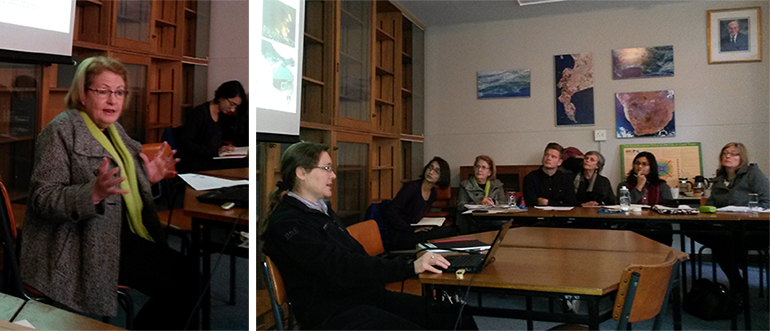
CTLIP’s Round 3 City Officials Exchange team meet for workshop
On 11 August 2015, the participants in the third round of the City Officials Exchange Programme and their writing partners met for their third writing workshop. In a departure from the previous to City officials exchange cohorts, who each wrote peer-reviewed journal articles, the third round will be writing a book, co-edited by Mark New (African Climate and Development Initiative, University of Cape Town), Helen Davies (Head: Environmental Policy and Strategy, City of Cape Town) and Di Scott (African Centre for Cities). The book will explore the topics of urban development and climate change, with an empirical focus on Cape Town.
Gordon Pirie (Deputy Director, African Centre for Cities) opened the workshop and highlighted the importance of 4 Ps in the exchange process: the sustained and growing partnership bet ween the City of Cape Town and the University of Cape Town; being host to experts in the knowledge of robust and rigorous policymaking; the participation of professionals in climate change debates; and the potential of this climate research to speak into a new field and to publishers. He highlighted too the importance of communicating science well, in order to make it intelligible and appealing to different audiences.
Zarina Patel (co-director of the Knowledge Transfer Programme, African Centre for Cities) and Amy Davison (co-director of the Knowledge Transfer Programme, City of Cape Town) reflected on the history of Mistra Urban Futures’ knowledge co-production approach for innovation to address urban issues. They too stressed the importance of the long-standing partnership between ACC and the City of Cape Town.
Helen Davies, Anna Taylor and Mark New then provided a detailed overview of climate change and its effects across Cape Town, which will become a framing chapter in the book, providing a contextual overview of the state of the field in Cape Town to which other chapters will complement and add to. The central premise here is that climate change is not an environmental issue alone, but also a social one.
This presentation and discussion was followed by a presentation on the concept of the third space, by Di Scott. She emphasised the opportunity that writing in the third space can offer, particularly the new insights that can emerge from bringing together different knowledge types to co-produce new findings.
Finally, Lucia Thesen (Language Development Group, University of Cape Town) facilitated an exercise in comparing policy and academic writing, and asked writing partners and officials to discuss the differences in audiences, in authority, what happens when authors grow comfortable working in both domains, and in what is learnt and lost by writing in the third space. This elicited fruitful discussion.
The City officials, their writing partners and their proposed chapters are as follows:
* Nicky Sasman (Spatial Planning and Urban Design Department, CoCT) and Liza Cirolia (ACC, UCT)
Social housing as a mechanism for residential densification in core areas
* Patricia Holmes (Environmental Resource Management Department) and Pippin Anderson (Environmental and Geographical Science, UCT)
Climate change and biodiversity planning in the City of Cape Town
* Julia Wood (Environmental Resource Management Department, CoCT) and Pippin Anderson (Environmental and Geographical Science, UCT)
Monitoring and evaluation of City’s nature reserves as a key tool in climate change resilience (METT)
* Sarah Chippendale, Darryl Colenbrander (Environmental Resource Management Department, CoCT) and Merle Sowman (Environmental and Geographical Science, UCT)
City coastal risk register
* Sumaya Mahomed (Environmental Resource Management Department, CoCT) and Wikus Kruger and Louis Tait (Energy Research Centre, UCT)
The energy demand site management programme
* Ken Sinclair-Smith ( Water and Sanitation Department, CoCT) and Kevin Winter (Environmental and Geographical Science, UCT)
City of Cape Town’s water conservation and demand management programme as a tool for managing climate change related risks to regional water security
* Zahra Noorbuckus (Informal Settlements Department, CoCT) and Gina Ziervogel (Environmental and Geographical Science, UCT)
Emergency relief in Green Park Informal Settlement
* Cliff Dorse (Environmental Resource Management Department, CoCT) and Alexander Paterson (Institute of Marine and Environmental Law, UCT)
Implementing a priority climate change corridor: The Dassenberg Coastal Catchment partnership